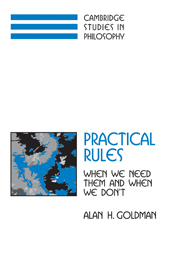
- Cited by 5
-
Cited byCrossref Citations
This Book has been cited by the following publications. This list is generated based on data provided by Crossref.
Allhoff, Fritz 2009. The War on Terror and the Ethics of Exceptionalism. Journal of Military Ethics, Vol. 8, Issue. 4, p. 265.
Schuessler, Rudolf 2015. Violating Strict Deontological Constraints: Excuse or Pardon?. Criminal Law and Philosophy, Vol. 9, Issue. 4, p. 587.
Möslein, Florian 2015. Third Parties in the European Banking Union: Regulatory and Supervisory Effects on Private Law Relationships Between Banks and their Clients or Creditors. European Business Organization Law Review, Vol. 16, Issue. 3, p. 547.
Faggion, Vinicius 2020. Is the Judicial Role Just a Descriptive Social Fact?. Problema. Anuario de Filosofía y Teoría del Derecho, Vol. 1, Issue. 14, p. 57.
Seoane Rodríguez, José Antonio 2023. A música e as normas. Unha lección musical para xuristas. Anuario da Facultade de Dereito da Universidade da Coruña, Vol. 27, Issue. , p. 160.
- Publisher:
- Cambridge University Press
- Online publication date:
- July 2009
- Print publication year:
- 2001
- Online ISBN:
- 9780511498787
- Subjects:
- Law: General Interest, Philosophy: General Interest, Logic, Law, Philosophy
- Series:
- Cambridge Studies in Philosophy


